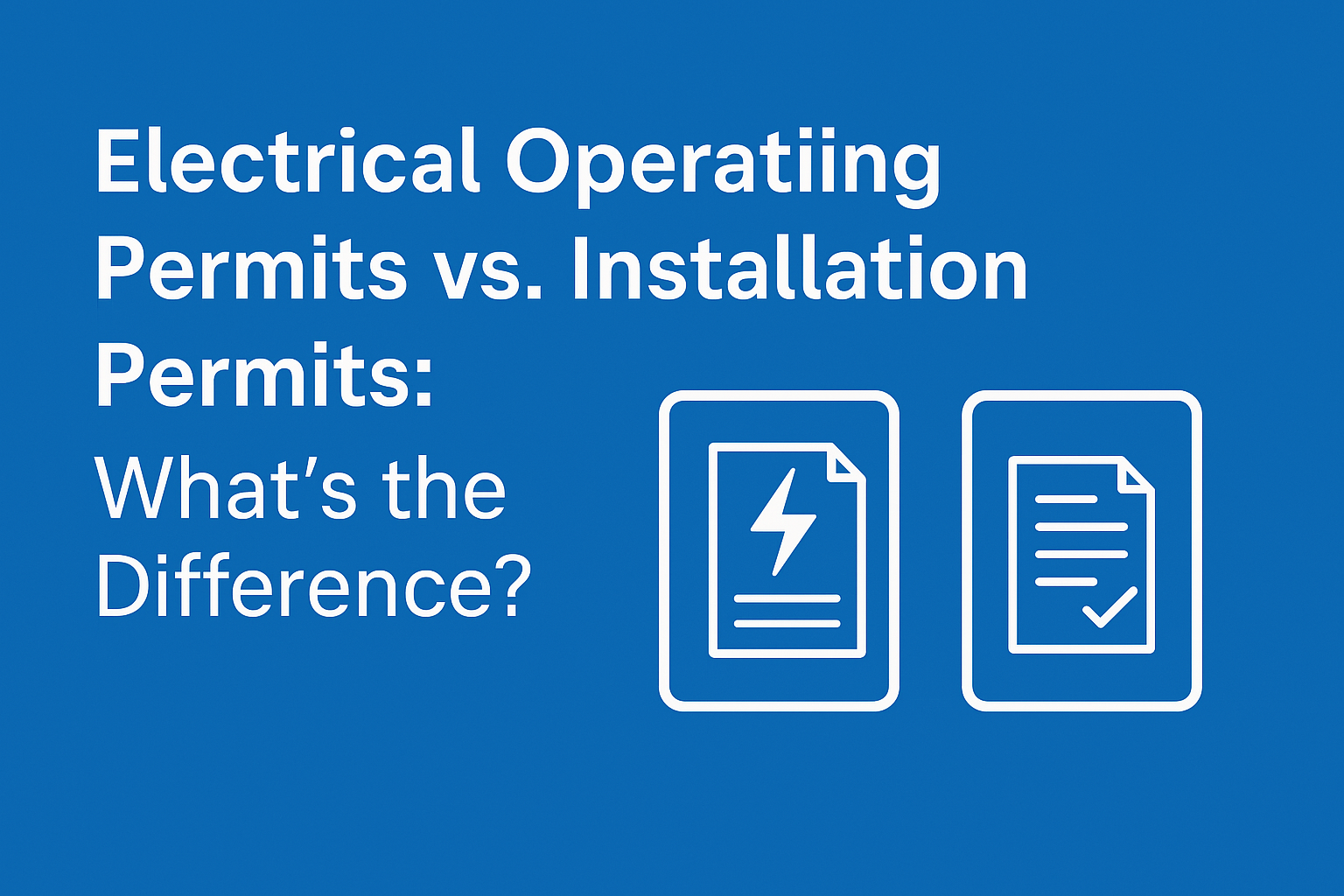Electrical Operating Permits vs. Installation Permits: What’s the Difference?
Operating PermitsElectrical Operating Permits vs. Installation Permits: What’s the Difference?
When it comes to electrical work in strata buildings across British Columbia, understanding the difference between an Electrical Operating Permit and an Electrical Installation Permit is critical. The two serve very different purposes, and confusing them could lead to safety risks, compliance issues, or unnecessary red tape.
If your strata is planning upgrades, handling routine maintenance, or just trying to stay on the right side of Technical Safety BC (TSBC) regulations, this guide will help you clearly understand when each permit applies—and why.
Why Electrical Permits Matter in BC
All electrical work in BC—whether in a private home, commercial facility, or strata corporation—is regulated under the Safety Standards Act. This ensures that installations and maintenance work are performed safely, legally, and by qualified professionals.
Strata corporations are especially affected, since they often maintain complex electrical systems serving common areas, elevators, lighting, fire alarms, and more. Choosing the right permit is part of keeping those systems safe and compliant.
What Is an Electrical Installation Permit?
An Electrical Installation Permit is used when you’re completing a one-time, project-specific electrical job—such as installing new equipment, rewiring, or upgrading your electrical panel.
When Do You Need an Installation Permit?
You need an installation permit if your strata is:
- Upgrading electrical service or main panels
- Installing EV charging stations (for the first time)
- Rewiring circuits in common areas
- Installing a new fire alarm system
- Replacing or adding new equipment not covered under an existing operating permit
Key Features of Installation Permits
- 📍 Project-based: One permit per job
- 📝 Requires inspection upon completion
- 📆 Expires after the work is done
- 👷 Issued to a qualified contractor or FSR
- ✅ Ensures new installations meet code
💡 Think of this as the permit you need for major upgrades or installations that are outside the scope of routine maintenance.
What Is an Electrical Operating Permit?
An Electrical Operating Permit (EOP), on the other hand, is designed to cover ongoing maintenance and small alterations for existing systems. It’s a long-term permit that stays active for as long as it’s renewed, allowing your strata to complete regulated work without needing a new permit each time.
When Do You Need an Operating Permit?
You need an EOP if your building:
- Has an electrical service greater than 250 kVA
- Operates equipment over 750 volts
- Performs regular electrical maintenance
- Has emergency or fire protection systems
- Runs elevators, parkade fans, or HVAC systems
Key Features of Operating Permits
- 🔁 Ongoing coverage: No need for new permits for every job
- 📅 Renewed annually
- 📓 Requires a logbook of all work done
- 👷 Must have a certified Field Safety Representative (FSR)
- 📤 Includes annual compliance declarations to TSBC
💡 This is the permit you need to legally maintain and manage your building’s electrical systems over time.
Side-by-Side Comparison
Here’s a quick breakdown to highlight the differences:
| Feature | Installation Permit | Operating Permit |
|---|---|---|
| Purpose | One-time projects/installations | Ongoing maintenance and small alterations |
| Duration | Valid until project is complete | Renewable annually |
| Requires FSR | Yes | Yes |
| Covers emergency systems | Only for new installs | Yes, for ongoing operation |
| Inspection required | Yes, upon completion | No, but TSBC may audit records |
| Recordkeeping | Project files | Permit logbook + annual declarations |
| Common for strata councils | EV charger installs, electrical upgrades | Elevators, fire alarms, parkade fans |
Why Choosing the Right Permit Matters
Strata corporations that use the wrong type of permit—or skip one altogether—could face serious issues:
- ⚠️ Regulatory non-compliance
- 🔍 Inspections or penalties from Technical Safety BC
- ❌ Insurance challenges if a claim arises
- 💰 Extra costs if work needs to be redone or re-permitted
In short, understanding the difference between these permits isn’t just about paperwork—it’s about keeping your residents safe and your building protected.
How to Know Which Permit You Need
If you’re unsure, start by asking the following:
- Is this a new system or a replacement/upgrade? → Likely needs an installation permit
- Are we doing regular service or replacing like-for-like equipment? → Covered by an operating permit
- Does the work increase electrical load or system size? → Installation permit
- Do we already hold an operating permit, and is the work within its scope? → No new permit needed
Still not sure? Your Field Safety Representative (FSR) or licensed electrician can advise you—and TSBC is always a helpful resource.
Summary
Understanding the difference between Electrical Operating Permits and Installation Permits is essential for any BC strata corporation managing electrical systems.
- Use an Installation Permit for new projects, upgrades, and major changes
- Use an Operating Permit for routine maintenance and ongoing alterations
Both serve important roles in maintaining electrical safety—and knowing which one you need will keep your strata compliant, protected, and efficient.
Frequently Asked Questions (FAQ)
Can a strata have both permits?
Yes! Many strata corporations hold an operating permit for ongoing needs, and obtain installation permits for major upgrades as needed.
What happens if we do work under the wrong permit?
You could face penalties from TSBC, be required to redo the work, or run into insurance coverage issues.
Does our electrician handle all this?
A licensed contractor typically handles installation permits, but strata councils must assign and maintain the operating permit and FSR. Don’t assume it’s being done—check and verify.
How do we apply for either permit?
Both can be applied for online via Technical Safety BC. Your contractor usually applies for installation permits, while the strata applies for the operating permit.

